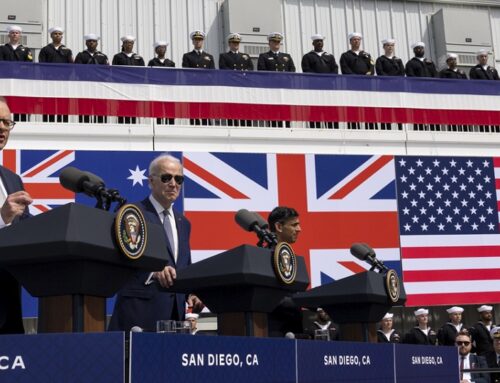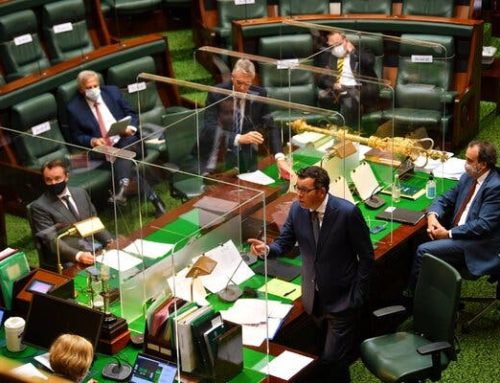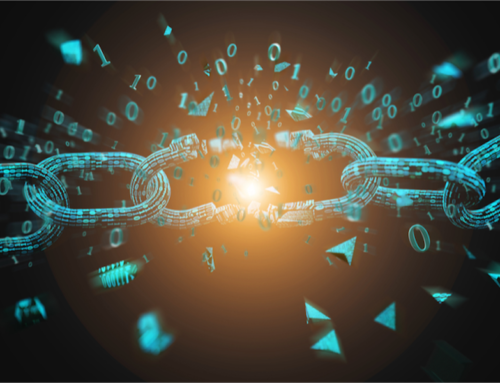The invasion of Ukraine is analysed and interpreted using a relational theory for IR, derived from quantum physics and based upon the ‘international quantum of action’
The philosophy of quantum physics offers a unique and promising means of clarifying the current crisis in Ukraine. By identifying the smallest unit/s of analysis within the crisis – the quantum of international action and its relations – we can interpret, understand, and describe foreign policy concepts such as ‘influence’ and ‘uncertainty’ in a fruitful and productive way. In this essay, I’ll undertake a provisional form of ‘relational analysis’ for the invasion of Ukraine, by quantizing the crisis.
Quantizing in Physics
Planck’s constant – what the early quantum physicists called the ‘quantum of action’ – is a mathematical constant that describes and governs the behaviour of particles at the subatomic level. The quantum of action, denoted by h, is the foundational and governing principle, therefore, of quantum physics. Incidentally, Planck stumbled upon his constant almost by accident. Planck wasn’t looking for a universal code. Instead, he was preparing a series of tables, recording the results of his black body radiation experiments, when he came to see that the relations between each series as well as the overall distribution were anything but arbitrary. In each instance, his findings referred to a very specific number: 6.62607015×10−34 J⋅Hz−1. But what is it? Is Planck’s constant a thing? Is it a force? Is it a yet undiscovered form of energy? Actually, no. The quantum of action is simply a formal relation that exists in the universe (it exists because it’s measurable and predictable) simply as a relation; the mathematical expression of some hidden code that underwrites the operation of our reality at the subatomic level. Everything that ‘happens’ in quantum physics manifests in the form of, and, is describable with reference to, some relation of h. The fundamental feature of quantum physics is the relationship between physical reality and Planck’s constant.
So, what has this got to do with the invasion of Ukraine?
Quantizing International Relations
Just as the most fundamental units of analysis in quantum physics are relations (those between atomic phenomena and the quantum of action), relations also happen to be the fundamental unit of analysis for international affairs. Although this sounds like a truism – since the governing discipline is, after all, called international relations – theories prioritizing the nature and influence of ‘relations’ are surprisingly few and far between in the contemporary field of International Relations! There are great theories about agents, structures, and institutions, but not so many dealing specifically with relations, per se. It’s almost like relations are the hidden variable that goes missing from the analysis, in favour of ‘things’ like states, leaders, culture, history, grand strategy, systems, and structures; or, ‘phenomena’ like globalisation, war, elections, or revolution. We say leaders influence domestic politics, but we don’t go into great detail about the specific nature of the relations generated between their agency and the context within which they operate. If agents influence structures and structures influence agents, we need to penetrate the mist of this co-constitutive relationship. Relations seem to be assumed, and sometimes assumed unproblematic. Structural violence is oppressive. Ok, but how? It gets complicated quite quickly.
Quantizing Sanctions
Consider sanctions. Sanctions theory says sanctions are useful because they can be considered a lower-cost alternative to other forms of ‘influence,’ like kinetic engagement, cyberwarfare, assassination, or fomenting a coup. Sanctions are designed to put (predominantly economic) pressure on ‘uncooperative’ states, and are intended to influence, shape, constrain, and otherwise manage their behaviour. But why do sanctions matter? Why do/ought economic penalties affect belligerent actors? The answer is relations: because of the relation between the sanctions, per se, and the situation of the target actor. According to theory, sanctions impose an ‘undesirable’ cost on the belligerent that they (presumably) want to avoid, and, therefore, the belligerent is expected to make a ‘rational’ (albeit reluctant) calculation that the cost of the sanctions outweigh whatever course of action they had intended on, or are, taking. Sanctions logic, therefore, assumes that both the instigator and the target of sanctions are capable of comparing the sanctions with whatever interest or intention the sanctions are intended to influence. In other words, there is a presumed and evident ‘relationship’ between the sanctions and the interests or intention of the belligerent. Strange then, that sanctions would be centered in the analysis rather than this relationship.
In a crisis, therefore, the quantum of international action is survival.
Just as in quantum physics, where the fundamental principle of subatomic behaviour can be described and accounted for by some relation to the quantum of action, so too, in foreign affairs, can the fundamental principle of international action during a crisis be described and accounted for by some relation to survival. Context, therefore, should always be interpreted and understood as the relationship between the crisis and the quantum of international action: survival. Consequently, the analysis of sanctions, properly understood, ought to involve an account of the relationship between the proposed sanctions and the security context of the proposed target.
This shift in analytic emphasis is both critical and unorthodox. Currently, we have a tendency to view sanctions as an absolute, or, perhaps relative course of action. That is to say, sanctions that reduce the economy of belligerent actor X by 20% are believed to impose either an absolute cost of 20% on the target, or a relative cost defined by some proportion thereof. When considered as a relationship to the security context of the belligerent, however, this view is revealed as somewhat mistaken. We have what philosophers and logicians refer to as a category error. Sanctions and survival are not competing variables at the same level of analysis, they are competing variables at different levels of analysis. Sanctions and survival can easily ‘talk past each other’ during a crisis. If the security situation is considered ‘existential’ (that is to say, it rises to the level of ultimate survival), the relationship between this survival context and a 20% reduction in economy is (at that given moment) negligible. This is not to say that the sanctions will have no effect. Rather, the effect will not (and necessarily cannot) be the intended outcome. Instead, effects will be governed by the principle of uncertainty, where unintended outcomes predominate.
And, so it is, and has been, with the Russian invasion of Ukraine.
Quantizing the Crisis
The West has chosen to pursue sanctions, ostensibly to influence Russian foreign policy. The packages of sanctionsinstituted across various rounds by the U.S., E.U., U.K., and their allies have been applied believing they would alter Russian behaviour in Ukraine. After around four weeks, however, the sanctions-only strategy cannot be described as any kind of success. Russia, under Vladimir Putin, has not changed course, has not reversed its foreign policy, has not altered its behaviour in Ukraine, despite what most commentators would describe as considerable economic pressure. If this week’s headlines can be considered reliable, some kind of detente between Ukraine and Russia might be in the offing, with Russia on the threshold of achieving most of its strategic objectives in Ukraine. The West, on the other hand, has not achieved its objectives. We wanted to mollify Russian aggression in Ukraine, stop the invasion, and bring Ukraine into the Western sphere of influence, characterised by EU and NATO membership. Instead, it appears Putin has secured a territorial corridor from Belarus, through the Donbas, down to Crimea and the Black Sea, and left the balance of Western Ukraine a broken mess.
Interestingly, political scientist, John J. Measheimer, predicted much of this almost a decade ago. Mearsheimer warned the West was “leading Ukraine down the primrose path,” by persistently encouraging efforts at NATO membership, and giving the Ukrainian people false hope that their incorporation into the Western sphere of influence could be a peaceful transition. What Mearsheimer has been trying to tell us for the past ten years is that what for Ukrainians seemed like an entirely reasonable expression of national self-determination, and for U.S. policymakers felt like the next logical move in Russian containment, would be seen by Russia (and, particularly under the leadership of Vladimir Putin) as an existential threat. Mearsheimer told us if we tried to take Ukraine away from Russia, Putin would wreck it. To paraphrase George Friedman, ‘you don’t need to hold and control a country for your invasion to be a success, you just need to break it so your enemies can’t play with it.’
Returning now to the relational analysis of the invasion of Ukraine, we come to understand why our strategy has not worked particularly well. Given the Russian ‘situation’ – that is to say, the relation between the crisis in Ukraine and the quantum of international action: survival – the relationship between what Russia (under Putin) considers an existential threat and the prospect of economic sanctions is negligible. This is why (so far) the basket of sanctions imposed by the West has not had an appreciable effect on Russian behaviour. This also explains why banning Russia from international sporting fixtures and events, shuttering luxury clothing stores in Moscow, censoring Russian content on Facebook, YouTube, and Twitter, and placing transaction limits on Russian-issued VISA, Amex, and Mastercards, is highly unlikely to deter Russian ambitions in Ukraine.
In this crisis, there are two relational dimensions that need to be considered: (1) what is the relationship between the crisis in Ukraine and the Russian quantum of international action: survival (the Russian context); and (2) what is the relationship between the Russian context and any course of action the West chooses the pursue (sanctions or otherwise ‘cancelling’ Russia, for example)? Without adequate consideration of the first and second relations, we have no meaningful basis for properly understanding the extent to which a proposed course of action may or may not influence Russian behaviour. Instead, we set in train a sequence of actions that certainly do have effects and influences, since they generate and necessitate a unique set of entangled relations. The reality, however, is that the effects and outcomes of our actions, rather than conforming to expectations, may well have numerous and significant unintended outcomes. Will ‘cancelling’ Russia from the Western international economic system accelerate the construction of Occidental/dissident systems, platforms, and institutions? Will Russia’s economic weakness present an opportunity for China? In other words, will our steadfast marginalisation of Russia lead to consolidation and long-term benefit for our opposition?
Final Thoughts
And what of Ukraine’s position? How do we account for the actions of the Ukrainian president, Volodymyr Zelensky? Is Ukraine not also subject to the same quantum of international action? Indeed, they are. In fact, Zelensky’s desire to institute a no-fly zone, seeking arms from Western allies, highlighting the humanitarian catastrophe, appealing to the principles of national sovereignty and international law, and pleading with Israel for assistance can all be interpreted as having a meaningful relationship to Ukraine’s survival. The Ukrainian president is pursuing these courses of action because he believes these eventualities are likely to secure Ukraine’s (and his personal, political) survival. The relationship between these courses of action and Ukraine’s quantum of action: survival, is exceptionally strong. Critically, Zelensky’s emphasis on the humanitarian and sovereignty dimensions of the crisis is intended to influence another, quite specific relation: the relation between the Western context and its quantum of international action. Since Zelensky can’t convince the West that, in the Donbas and Crimea, the West’s geostrategic survival is at stake, perhaps he can convince the West that its professed commitments to humanitarianism and sovereignty are.
Conspicuously absent in this essay and its analysis of the invasion of Ukraine, has been any discussion of the relationship between the invasion of Ukraine and the Western quantum of international action in a crisis: survival (the Western context). To what degree does the invasion of Ukraine place the West in a crisis? What kind of crisis? An entirely different way of interpreting, understanding, and describing the relative failure of Western sanctions in altering Russian behaviour could be based upon a belief that the relation between the invasion of Ukraine and the Western quantum of international action in a crisis: survival, is describable as ‘modest’ or ‘low-priority.’ If this assessment of the relationship between the crisis in Ukraine and the Western quantum of international action is accurate, it suggests the implementation of sanctions reflects another, perhaps far more important relation: the relationship between sanctions and the Western context. Finally, if Zelensky’s entreaties to the West’s professed commitment to humanitarianism and sovereignty are unable to elicit the outcomes he desires, perhaps we can conclude that the relationship between actions that would elevate the relation between the crisis in Ukraine and the West’s quantum of international action: survival (by bringing the West closer to a direct conflict with Russia), outweigh humanitarian and sovereignty considerations. I leave readers to mull over these suggestions.







Leave a Reply